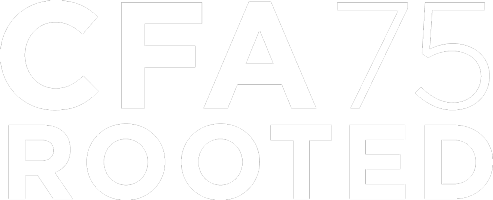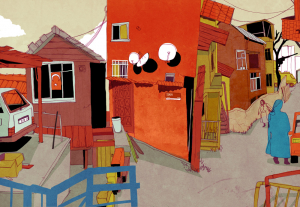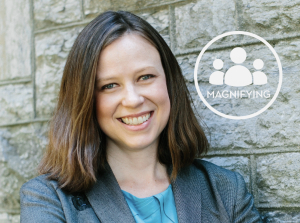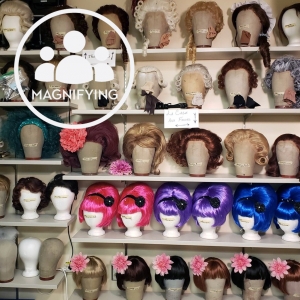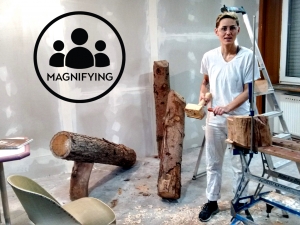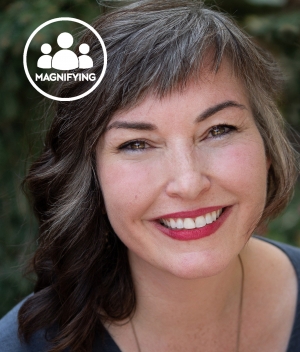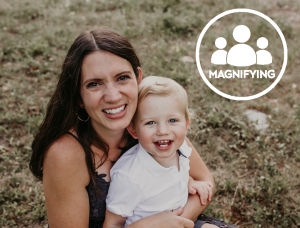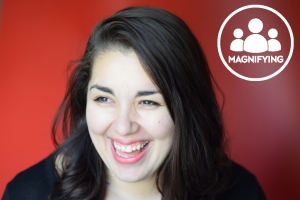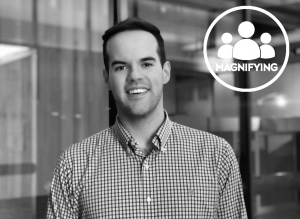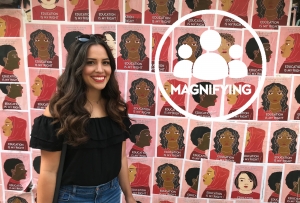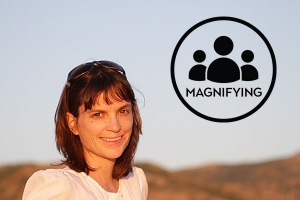Displaying items by tag: Magnifying
MAGNIFYING No. 24: Michael Hirshon
MAGNIFYING is a series dedicated to showcasing the talent of our students, faculty, and staff to help you learn more about the remarkable individuals within our creative community here at the College of Fine Arts.
Michael Hirshon is a freelance illustrator and assistant professor of Illustration in the Department of Art & Art History. He holds a BFA in Visual Communication and Psychology from Washington University in St. Louis and an MFA in Illustration as Visual Essay from the School of Visual Arts in New York City. He has spent the past decade working with a wide array of clients including The New York Times, HarperCollins Publishers, Amazon, The Washington Post, Forbes, and American Express. His work has been recognized by the Society of Illustrators, American Illustration, Spectrum, CMYK, and 3x3.
Michael is enthusiastic about illustration and enjoys seeking out unusual avenues for visual storytelling. He has collaborated on packaging for a dog toy company, a taco truck chef’s cookbook, the side of a city bus, a dating coach’s graphic memoir, a US Senate campaign, and the walls of a daycare in Pakistan.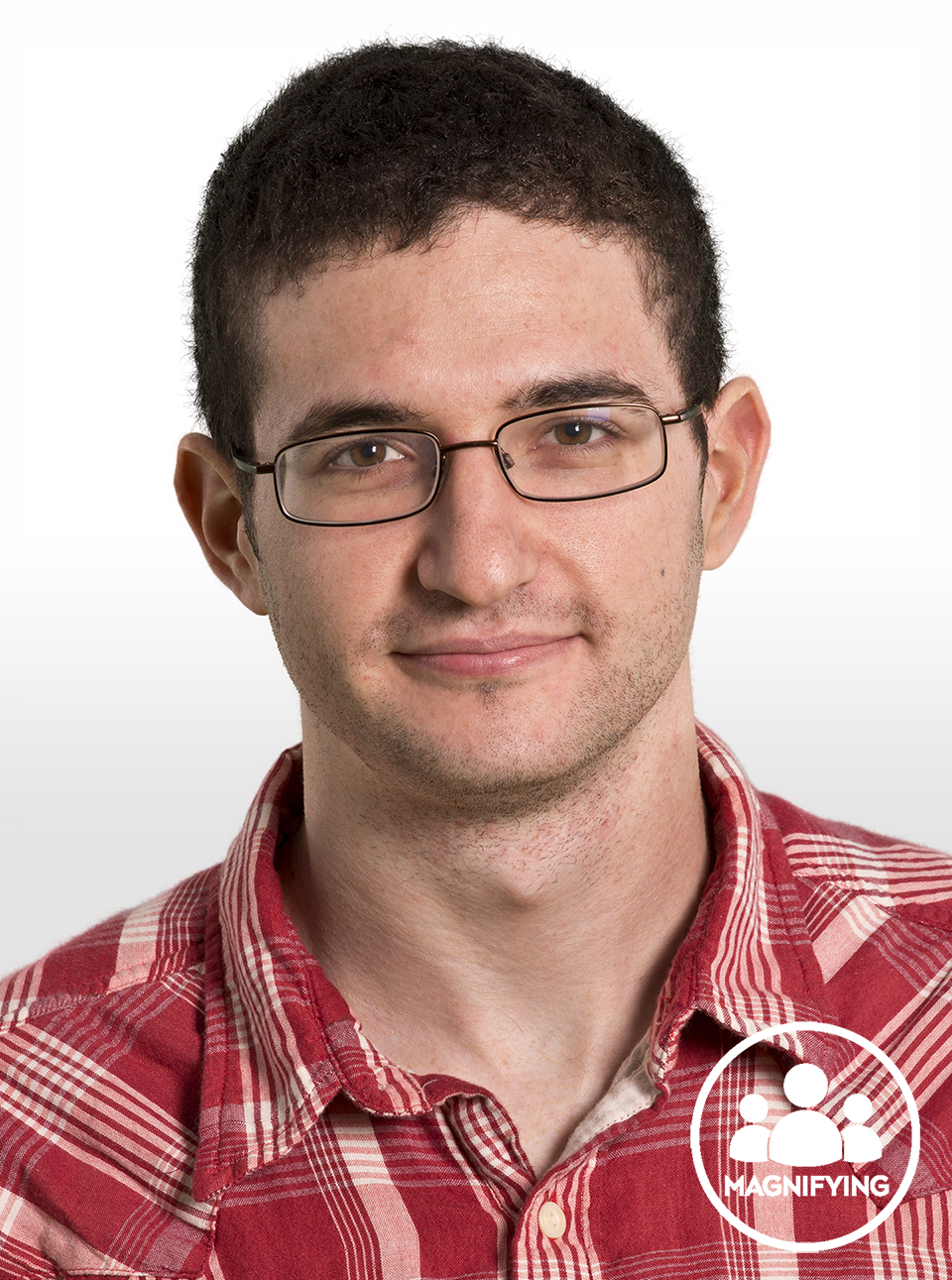
What do you consider your first big break in illustration?
My big break is kind of the equivalent of winning the illustration lottery. At the end of my senior year of college, I was very fortunately offered a huge project to illustrate a localized “We Accept American Express” sticker for the city of St. Louis. I’d put up a portfolio website, not expecting any kind of response until well after graduation...and now here I was, negotiating contracts and asking my professors about “kill fees” and “usage rights.” Legal jargon aside, it was a very positive experience and the perfect introduction to the process of collaborating with an art director. Best of all, the fee allowed me to support myself long enough to build a viable freelance business.
What is/was the process of building a network of freelance clients?
As an illustrator, I’m always trying to find the best ways to connect with the people who will actually commission work from me. In most cases, these people are art directors: an elusive group of designers who are very busy, and constantly being bombarded with self-promotional materials from thousands of incredibly talented illustrators. My strategy is to get these art directors to look at my website by sending them emails or postcards with work that I think will interest them. I’ve sent out thousands of postcards and tens of thousands of emails, and the 1-2% of people who have actually responded have become my client base. It’s an exhausting numbers game, for sure. But the most important part of building my network was making an effort to be flexible, versatile, and punctual. When it comes down to it, art directors like to work with people who are easy to work with, and if you can prove to be a consistent and productive collaborative partner, they will come back for more illustrations. Repeat clients now provide the majority of my work, and that allows me to focus more on drawing and less on sales.
What habits or rituals are essential to the success of your creative practice?
While it’s not really a habit or a ritual, my sketchbook is a foundation of my practice that touches every part of what I do. It’s where I process my ideas and experiences, for both client and personal work. When I flip through my old sketchbooks, I’m looking at a visual record of my creative development — a map of all the trends and habits in my work. Right now I’m working on a book where the art directors want me to treat each illustration as one of my sketchbook drawings, which has proven to be trickier than I’d thought. While it’s easy to make it stylistically similar, there’s no replacement for the lack of constraint or stakes that comes from actually working in a sketchbook. It’s important to have a place to make mistakes and try out awful ideas.
What will students in your illustration emphasis classes be focusing on?
The illustration emphasis is designed to expose students to a broad range of everything that illustration can be: books, editorial, advertisements, concept art, products, fashion, surfaces — you name it. My goal is that students come out of the program thinking like illustrators, confident in using their unique voices to tell any kind of story. There will be a lot of freedom for students both to explore, and to focus on specific interests by their final year. Students will be able to pursue more traditional pathways of illustration (magazine illustration, book covers, etc) or work with me to create their own path.
Can you tell us about one or two of your most unusual projects and how your approach may have differed because of the topic or format?
I worked on a series of illustrations for a now-defunct startup aimed at replacing members of Congress with a voting app (I’m guessing my art wasn’t the reason why the startup failed, but that’s an obviously biased opinion). They wanted illustrations that could be posted on social media: things like “I voted YES on Prop #999.” The tricky part is that they only wanted to pay for one illustration per issue, so I was designing images that could be interpreted as a YES or a NO depending on the accompanying text. It made for a really interesting challenge where I was analyzing peoples’ biases and viewpoints and creating images with enough ambiguity to be seen either way. For example: an image of a crowd of smiling citizens holding assault rifles, children included. Anti-gun people would see this image and focus on the ridiculousness of a child holding an assault rifle. Pro-gun people would see the image and focus on the happy expression of the people and see an ideal vision of society. The text does the heavy lifting. The assignment was an eye-opener for me, and changed my approach to future assignments. Interpretation is a tricky thing to navigate, but with enough knowledge of your audience, you can guide people’s understanding of your story.
Follow Michael's work on Instagram at @michaelhirshon.
MAGNIFYING, No. 22: Elizabeth T. Craft
MAGNIFYING is a series dedicated to showcasing the talent of our students, faculty, and staff to help you learn more about the remarkable individuals within our creative community here at the College of Fine Arts.
Elizabeth T. Craft is an Assistant Professor of Musicology in the School of Music. Before joining the faculty at the University of Utah, Craft completed her Ph.D. at Harvard University and taught at Wellesley College and Northeastern University. Her research crosses disciplinary boundaries to explore how music conveys sociopolitical values and constructs national identity, focusing especially on musical theater from the early twentieth century through the present.
Craft’s recent publications examine the politics and reception of the musical Hamilton (in the journal American Music), the George M. Cohan biopic Yankee Doodle Dandy (in The Oxford Handbook of Musical Theatre Screen Adaptations), and the musicals of Lin-Manuel Miranda (forthcoming in The Routledge Companion to the Contemporary Musical). Her work also appears in The Critical Companion to the American Stage Musical, Crosscurrents: American and European Music in Interaction, 1900–2000, the journal Studies in Musical Theatre, and New York Public Library’s Musical of the Month blog. She is currently writing a book on the Broadway musicals and cultural impact of the composer, playwright, actor, director, and producer George M. Cohan.This past summer, Craft was invited to speak at the “You’re a Grand Old Rag” Paragon Ragtime Orchestra concert and Cohan celebration at La Mirada Theatre in La Mirada, California. She was also interviewed on the Slate podcast Hit Parade with Chris Molanphy.
When did you first know you wanted to get into the arts?
When I performed in the chorus of Fiddler on the Roof in my small-town community theater production in middle school—I was hooked! Actually, though, even when I went to college and double-majored in music and sociology, I thought music would be an avocation. Doing a senior honors thesis about depictions of crime in musical theater opened my eyes to the ways in which I might combine my artistic and scholarly interests and make a career of it.
Have there been any twists and turns in your career that you didn’t expect?
Certainly. I thought I might go straight into a Ph.D. program from my undergraduate degree, but my undergraduate studies had been interdisciplinary, and getting a master's in musicology allowed me to really learn my field so that I was well prepared when I entered the Ph.D. program at Harvard University. I also never would have guessed I’d be writing a book on George M. Cohan!
What draws you to George M. Cohan?
Growing up, I loved the Fourth of July. My town hosted North Carolina’s official Fourth of July festival, a week-long celebration. I grew up hearing Cohan’s songs—like “You’re a Grand Old Flag” and “The Yankee Doodle Boy”—but not knowing that they came from musicals. When I started working on my dissertation, on immigrant narratives in musical theater, I learned that Cohan was Irish American. In a period when the Irish occupied society’s bottom rungs and were considered inferior to Anglo-Saxon whites, he became an emblem of American patriotism, known as the “Yankee Doodle Dandy” he sang about in one of his hit songs. It’s a fascinating story.
What is your favorite memory from the University of Utah?
There are so many! I love the feeling when a class discussion goes really well and as a result, we all come to a deeper understanding of a complex topic. This happened over the course of the semester when I taught a seminar called “Performing Race on Broadway” as we discussed the thorny subjects of racial representation, casting, and the stereotypes embedded in classic works. I’ve also had amazing opportunities to collaborate with local institutions to bring guests to campus—hearing Jeremy Howard Beck talk about his new opera The Long Walk, about an Iraq veteran’s attempts to readjust to life in the United States, and then seeing the Utah Opera production with my “Opera Literature” class was a stunningly powerful experience.
MAGNIFYING, No. 20: Amanda French
By Noelle Sharp
For this episode of MAGNIFYING we spoke with Wig Master, Hair and Makeup Designer for Pioneer Theatre Company and the Department of Theatre, and Adjunct Assistant Professor for the Department of Theatre Amanda French. Our creative community here at the College of Fine Arts is diverse and wide spread. With the goal of gaining a deeper knowledge and awareness of the people within our community, we bring you MAGNIFYING, a series dedicated to showcasing the talent of our students, faculty, and staff.
Tell us about yourself: Name, where you are from, what you do and how you got into in your field of work
My name is Amanda French and I am originally from Cincinnati, Ohio. I am the Wig Master and Hair and Makeup Designer for Pioneer Theatre Company and the Department of Theatre, and Adjunct Assistant Professor for the Department of Theatre teaching stage makeup classes, and classes in all aspects of wig and makeup design.
I construct and style all of the wigs and facial hair for all Pioneer Theatre productions and for the 4 mainstage productions for the department of theatre. I make sure that all of the performers know how to do their own makeup for the productions, including instruction as needed. I have also done prosthetics for productions, including the severed head for Macbeth, the nose and mouth pieces for the Beast in Beauty and the Beast, and Cyrano’s nose in Cyrano de Bergerac. I have been at Pioneer and the University since 2003, and have worked on over 200 productions in that time.
My path to this job has been quite varied, and this is the short version: In high school I wasn’t the best academic student, but enjoyed my time in 3 different choirs, and marching and concert band. I was never a part of the drama club, but did enjoy being in the chorus of Guys and Dolls my senior year. At the time, a career in theater was never on my radar. My first year in college I studied music education and voice, then when my family moved to Pennsylvania, I went to a community college where I took acting classes, and joined a swing choir. I did a small amount of acting and helped backstage doing props, and sound, then found my way to a stage makeup class – which I loved. A couple of summers I worked as an assistant stage manager for a small community theater, and decided that I loved working backstage and needed to focus on that work. I applied to and then attended the University of Cincinnati – College Conservatory of Music (CCM) from 1986-1990 where my major was in design and technical theater with an emphasis in wigs and makeup. I continued to work as an assistant stage manager (ASM) and did a couple of internships with Cincinnati Playhouse in the Park. By the time I left CCM in 1990, I was working professionally as an ASM, and when I wasn’t doing that, I was doing wigs and makeup. In 1992 I decided to focus on wigs and makeup, got a job teaching at The School for Creative and Performing Arts in Cincinnati, and never looked back. I have been blessed with a 30 year career doing what I love.
What has surprised you the most in your life?
What has surprised me the most is how important teaching has become to me. There have been several articles in the New York Times in the last couple of years that talk about wig making becoming a dying art as some of the best in the business in the US, like Mr. Paul Huntley in New York, get closer to retirement. However, the author of the article neglected to look outside of the city, to find out how many great wig masters and wig artists there are in the Regional Theater world, and working for professional touring companies all over the country. There are very few schools that have wig and makeup design as an emphasis or major, and it is very important to keep this field supported. Being a wig maker is a job that has existed since at least the time of the Egyptians, and isn’t going any where soon, but we need more active professionals to teach the very specific skill sets that are required for building wigs. This is not a skill set that is taught in beauty schools at all, and more universities need to include it as a major in their technical theater departments, taught by working professional wig masters.
What do you wish you had known/been told?
I was actually warned several times that it is hard to make money in live theater. Most of my classmates went into film and television, and I am one of the few who chose to stay in live theater. I wish that I had learned more about the business side of show business and that I had reached out to more professionals in the field for guidance, early in my career. But then, that was before the days of the internet, and it is much easier now!
MAGNIFYING, No. 19: Kelsey Harrison
By Noelle Sharp
For this episode of MAGNIFYING we spoke with Department of Art & Art History Assistant Professor Kelsey Harrison. Our creative community here at the College of Fine Arts is diverse and wide spread. With the goal of gaining a deeper knowledge and awareness of the people within our community, we bring you MAGNIFYING, a series dedicated to showcasing the talent of our students, faculty, and staff.
Tell us about yourself: Name, where you are from, what you do and how you got into in your field of work
My name is Kelsey Harrison and I am from the Bay Area in California. I make sculpture and teach in the Sculpture Intermedia area in the Department of Art and Art History. I got into it when, in the transition from middle to high school, technical classes were no longer available and the closest thing was a 3D art class. We worked in ceramic and small metals. I fell in love with the atmosphere and spent nearly every moment, spare or otherwise..., in the Crafts classroom. I studied sculpture in college because I never stopped making sculpture, even when I dabbled in other possible majors in community college.
What has surprised you the most in your life?
Most things, honestly. I didn't have a long-term vision when I was younger. I never expected to be a professor. I never expected to be as professionally oriented and serious as I have been in the last few years. I was a party girl in high school-I won the superlative of "biggest slacker" in our high school year book. When I began taking myself and my abilities seriously, everything began to change and since then every single thing has been a surprise.
What do you wish you had known/been told?
Ambition for its own sake isn't worth much. Ambition should, if you value it, be in relationship to what you love and what makes you happy. In a minor way, I fell into the trap of wanting what I thought I should want, meeting benchmarks of success that were..."natural next steps" in my field rather than setting benchmarks based on making the life I want. Trust yourself and listen to yourself, and center ambitions around what you find when you do. This is something I was told, of course, but I wish I hadn't decided it was a corny platitude. Corny platitudes, as much as they make my skin crawl, have largely proven to be valuable axioms. Your art won't be satisfying to you if you aren't trusting yourself and listening, even if your work is patently not interested in "self-expression" as the highest value.
MAGNIFYING, No. 18: Alexandra Harbold
By Noelle Sharp
For this episode of MAGNIFYING we spoke with Department of Theatre Assistant Professor of Directing and Co-Founder & Co-Artistic Director of the Flying Bobcat Theatrical Laboratory, Alexandra Harbold. Our creative community here at the College of Fine Arts is diverse and wide spread. With the goal of gaining a deeper knowledge and awareness of the people within our community, we bring you MAGNIFYING, a series dedicated to showcasing the talent of our students, faculty, and staff.
Tell us about yourself: Name, where you are from, what you do and how you got into in your field of work
My name is Alexandra Harbold. I grew up in Williamsburg, Virginia and earned my bachelor’s at Middlebury College in Vermont and my masters at the University of London, Goldsmiths College. My grandparents met playing opposite one another in a production of Noel Coward’s Hay Fever, so theatre always felt encoded in the DNA and lore of our family.
What has surprised you the most in your life?
Where we find and make our homes and lives. Having grown up on the East Coast, I always expected to land there. When I was in London for grad school, I felt like I’d found home. Which made coming back to the States challenging in new ways – I found myself looking for that kinship I felt to London and couldn’t really find it. I’ve lived in New York City, Seattle, and Chicago… When we moved to Salt Lake City for my husband’s work, we thought it was a stopgap and that we would only be here for a year or two. That was in 2004.
What do you wish you had known/been told?
I wish I’d recognized that the sense of not knowing enough that used to get me tangled in knots was only problematic because I thought I was supposed to ‘get it’ the first time. As if our capacity to understand and create are fixed points, our once and future reality. Now I recognize that creativity and craft grow in direct correspondence to curiosity and resilience/stubbornness. In a SITI Company blog a few years ago, Artistic Director/author Anne Bogart wrote about the necessity of deep practice, referencing neuroscientists’ discovery that ‘only after 10,000 hours of practice is real progress and innovation possible.’
So I keep working towards that 10,000 hours.
MAGNIFYING, No. 16: Devon Barnes
For this episode of MAGNIFYING we spoke with Development Director Devon Barnes. Our creative community here at the College of Fine Arts is diverse and wide spread. With the goal of gaining a deeper knowledge and awareness of the people within our community, we bring you MAGNIFYING, a series dedicated to showcasing the talent of our students, faculty, and staff.
Tell us about yourself: Name, where you are from, what you do and how you got into in your field of work
My name is Devon Barnes. I am originally from a suburb outside of Philadelphia, Pennsylvania. I came to attend the University of Utah as a freshman in the fall of 2005. It was that fall that my new college friends decided to get a part-time job working for the University of Utah Phonathon; making outbound phone calls and fundraising on behalf of the University. I decided to join my friends and also get a part-time job as a student caller. It was with the Phonathon that I learned of the importance of fundraising and connecting alumni back to the University while sharing the impact of a gift, of any size, to the U. As many fundraisers, I feel as though I accidently fell into fundraising. A part-time job truly changed my life and I knew I wanted to continue this line of work by making a difference one donation at a time.
What has surprised you the most in your life?
I am most surprised by how much I fell in love with Utah and the University of Utah. Although I was excited to come to the University, I never imagined staying long-term. When I came to the U, I considered myself a “Philly Girl”. I always thought I would return back east. I was born and raised in Pennsylvania and the majority of my family still resdies in the area, now. However, to my surprise, after experiencing the usual home-sickness and getting past that, I fell in love with the U, Salt Lake City, and everything Utah had to offer- from the Mountains to being able to camp under the stars in Southern Utah. Additionally, a few years into attending college, I met my now husband. The University of Utah and Salt Lake City is very dear to my heart and quickly became my home.
What do you wish you had known/been told?
Before classes officially began for me, my parents accompanied me to Salt Lake City where I toured campus and attended orientation. When it was time for my parents to return to Pennsylvania, I recall my father telling me that it was OK to play hard, but first I had to work hard. As an 18-year old, I simply acknowledged the comment and started my new freshman life in the dorms. After making mistakes and learning from those mistakes, I have come to truly appreciate the saying: work hard/ play hard. However, I wish, then, I truly understood what my father was saying. There have been times in my life that the work hard/ play hard motto hasn’t been so even. Over time, I have learned that those two need to be in balance with each other. To this day, I try to live by this motto and in return enjoy life to its fullest.
MAGNIFYING, No. 17: Ana Breton
For this episode of MAGNIFYING we spoke with Department of Film & Media Arts alumn and Digital Producer Ana Breton. Our creative community here at the College of Fine Arts is diverse and wide spread. With the goal of gaining a deeper knowledge and awareness of the people within our community, we bring you MAGNIFYING, a series dedicated to showcasing the talent of our students, faculty, and staff.
Tell us about yourself?
I was born in Mexico City. I grew up in Utah and now live in New York. I'm currently a digital producer for Full Frontal with Samantha Bee. I've always been interested in video and have been involved in making documentaries, TV shows and movies.
What has surprised you the most in your life?
Being nominated for an Emmy two years in a row. It still feels like a dream. (We lost, but that's ok)
What do you wish you had known/been told?
If you continue to work toward your dream, you'll eventually get there. I know this sounds insane and probably too simple, but I've learned that there are enough people who quit along that way, that if you just keep working on the path you're on, you'll eventually get there. Don't give up.
MAGNIFYING, No. 15: Blake Bratcher
For this episode of MAGNIFYING we spoke with Development Specialist Blake Bratcher. Our creative community here at the College of Fine Arts is diverse and wide spread. With the goal of gaining a deeper knowledge and awareness of the people within our community, we bring you MAGNIFYING, a series dedicated to showcasing the talent of our students, faculty, and staff.
Tell us about yourself: Name, where you are from, what you do and how you got into in your field of work
Hi there – My name is Blake S. Bratcher and I currently have the privilege of working for the College of Fine Arts in the role of Development Specialist. As a semi-recent M.Ed. Graduate of the College of Education, I began my time in Salt Lake City in 2016 moving from the small community of Tontitown, Arkansas. My childhood was filled with memories of a tight-knit familial atmosphere, one of which was supported by conservative ideologies that I begged to challenge as I got older. In doing so, I realized the profound impact that friends, mentors, teachers, and professors during my undergraduate years had on me. Therefore, one aspect of my life that I have always extremely valued is relationships. Relationships, no matter personal or professional, have always been the means of transportation that have assisted me in not only figuring out my own identity, but appreciating those identities around me. Now being 1,200+ miles away from home, the University of Utah and all the fabulous individuals who encompass it have been nothing short of supportive in fostering my own personal development and as a staff member. Anyway, I guess it is time to answer your question! In my last semester of graduate school, I was incredibly grateful to be a Development Intern in the Vice President’s Office for Institutional Advancement, assisting in research under Chris Ostrander, Executive Director of Foundation Relations. This experience, coinciding with my time as a Graduate Assistant in the A. Ray Olpin Union Administration Office, the field of Development (and the relationships within), had me craving more. My time in the College of Fine Arts has been filled with a broad spectrum of items, all the way from assembling massive paper lanterns in the 90-degree July heat, to playing a minor role in developing major million-dollar proposals. Would I change a thing? Absolutely not – Daily, I am reminded of how truly grateful I am to work with such passionate people. Also, I am reminded of how integral relationships are in supporting each academic area that makes the College of Fine Arts a vital component in creating the “One U” student. The field of Development is still very new to me, but as I am fortunate enough to be given new opportunities daily, led and advised by my incredibly knowledgeable colleagues, I look forward to welcoming the many years ahead.
What has surprised you the most in your life?
Depending on the day of the week, I either hate or love surprises. Namely, if the surprise involves cash, puppies, or a new car, I welcome them with open arms. But in all seriousness, I think the one thing that has surprised me most in my life is how incredibly privileged I am to be where I am today. All too often, either with national news or campus tragedies, we are reminded of the tribulations that our various communities are facing. During those times, including in my own experiences, people will naturally gravitate to those relationships who support, nurture, challenge and remediate problems that they may be facing. Therefore, I am surprised how much I lucked out in still having that tight-knit familial atmosphere so far away from home.
What do you wish you had known/been told?
First off, I absolutely love this question and ask it in my own ventures, simply because I believe it to be a prime chance for individuals to be vulnerable and honest. That being said, I wish I had been told from a very young age, and granted my parents said this often, that “Everything will be okay.” Yes, I do believe some things happen for a reason, but maybe not quite everything, and the outcome of those things and one’s reactive state is something I think to be heavily dependent on your ability to believe everything will be okay in the end. I acknowledge that I am a huge proponent of worst-case scenario thinking (and for the record to clear my name, I’d argue the correct term is realism as opposed to pessimism) but counteractive to that, recent reaffirmations have made my own confidence in this saying to be elevated. No, you will not get fired immediately if you have a minor slip-up in your job (you’ll learn, everything will be okay). No, the world will not end if you forget to call your mom back (actually, debatable. but everything will be okay). Although minuscule to most, this saying and the mindset it brings is something I should have known all along. And moving forward, I am cutting myself some slack to believe in it more.
MAGNIFYING, No. 13: Josiane Dubois
by Noelle Sharp
For this episode of MAGNIFYING we spoke with Communications and Marketing Coordinator for the Department of Theatre, Josiane Dubois. Our creative community here at the College of Fine Arts is diverse and wide spread. With the goal of gaining a deeper knowledge and awareness of the people within our community, we bring you MAGNIFYING, a series dedicated to showcasing the talent of our students, faculty, and staff.
Tell us about yourself: Name, where you are from, what you do and how you got into in your field of work.
My name is Josiane Dubois. I was born in Lima, Peru, and moved to Salt Lake at the age of 9. I’m the Communications and Marketing Coordinator for the Department of Theatre. I started working in the Department when I was studying Strategic Communication as an undergrad. This summer I’m finishing a Master’s degree in Health Promotion and Education at the U. Through my research in nutritional label literacy, I’m redesigning Front-of-Package Symbols (FOPs) to make nutrition information quicker and easier to notice, understand, and use in low-health-literacy populations. In the future, I hope to work with health programs that utilize art to promote wellness.
What has surprised you the most in your life?
The need to go back to my roots. The older I get, the more interested I am in Latin American writers, poets, musicians, and other artists. As a child, I dreaded listening to the music my grandparents played at family parties, but now those are the same songs I play to feel connected to my family abroad and to my memories of Peru. I never thought that I would play “La Flor de la Canela” by Chabuca Granda on my Spotify at work, or that I would be humming “En Barranquilla Me Quedo” while walking my dog.
For a long time, I neglected reading or listening to music in Spanish because I wanted to assimilate into the neighborhood where I grew up. I’m really thankful that during my time at University I was encouraged to embrace the different cultures I had lived in. TV series like “Jane the Virgin,” “Mozart in the Jungle,” and “One Day at a Time” similarly portray my experience of growing up around multi-generational Latinx people who speak Spanish, English, and other languages interchangeably. I love working in a community of storytellers who create bridges through art.
What do you wish you had known/been told?
I wish I had learned earlier the power of speaking for myself. In a Conflict and Resolution class during my undergrad, I learned about using “I” statements. Ever since, I feel as if I have been able to communicate more effectively with others.
MAGNIFYING, No. 11: Paula Lee
by Noelle Sharp
For this episode of MAGNIFYING we spoke with Program Manager in the Department of Film & Media Arts, Paula Lee. Our creative community here at the College of Fine Arts is diverse and wide spread. With the goal of gaining a deeper knowledge and awareness of the people within our community, we bring you MAGNIFYING, a series dedicated to showcasing the talent of our students, faculty, and staff.
Tell us about yourself, name, where you are from, what you do and how you got into in your field of work
Paula Lee, Originally from England but long time SLC resident. Program Manager, Department of Film & Media Arts. I have been at the University for a long time, initially as an undergraduate and then as an academic advisor. In graduate school (also at the U) my thesis project was producing a film. All my experience put together made the Film Department a great fit for me. I love working on campus and the energy of the learning environment. Truth be told, I’d be a permanent student if I were given the choice!
What has surprised you the most in your life?
Being outside and quiet is a key to creativity. Whenever I have any issue in my life, taking a hike or quiet gardening give my brain space to problem solve.
What do you wish you had known/been told?
Specifically addressing academics I would say: Be more involved in the extracurricular opportunities in school, it allows you to engage deeply with your work and cohort, and you only get one chance to do it!

